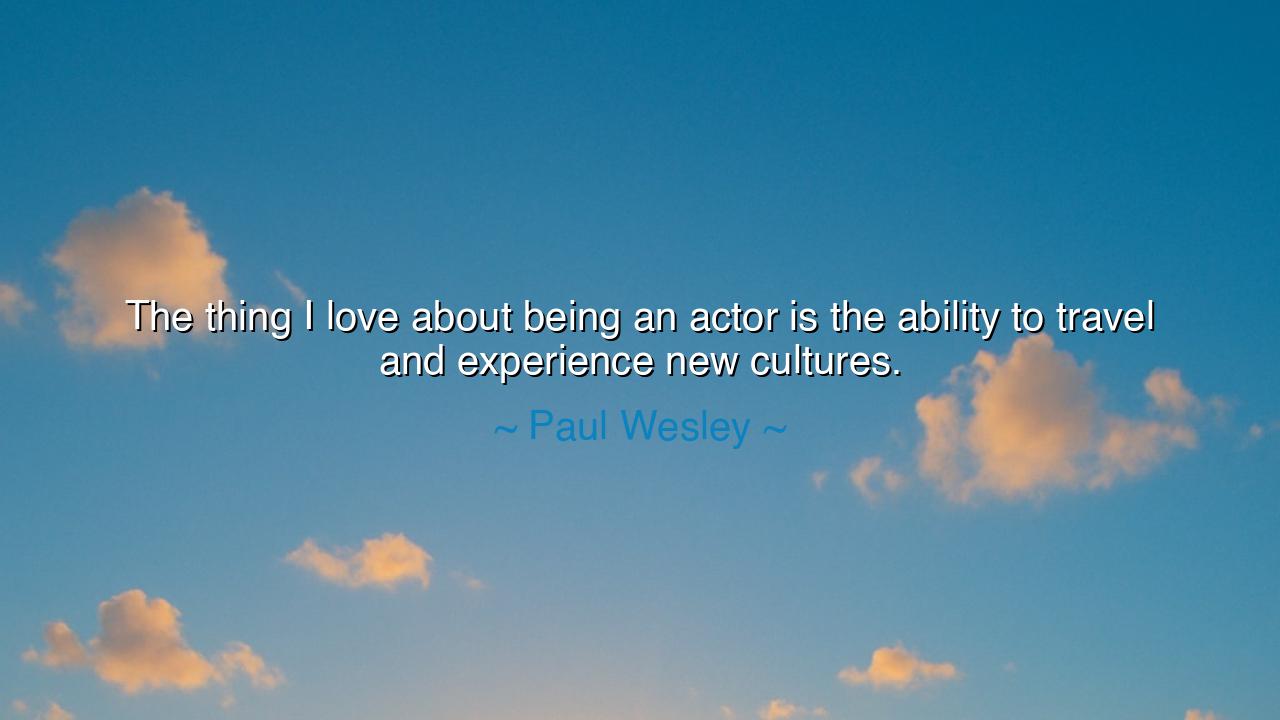
The thing I love about being an actor is the ability to travel
The thing I love about being an actor is the ability to travel and experience new cultures.






The words of Paul Wesley — “The thing I love about being an actor is the ability to travel and experience new cultures.” — speak not only of the art of performance but of the deeper calling of the human spirit: the hunger to wander, to learn, to encounter the vastness of humanity beyond one’s own walls. For though an actor lives to embody other lives upon the stage or screen, the greatest role he undertakes is that of the traveler who steps into the worlds of others, listening, observing, and being transformed by what he discovers.
To travel is not merely to move across the earth, but to enter into dialogue with the unknown. Each land carries its stories, each people their wisdom, each tradition its treasure. The actor, in seeking to tell human stories with authenticity, finds in these journeys the nourishment of his craft. He gathers gestures, voices, and truths not from imagination alone, but from the living pulse of diverse cultures. Wesley’s words reveal that performance is not just mimicry, but communion: the merging of one’s art with the endless variety of human experience.
The ancients too knew this truth. Think of Herodotus, called the “Father of History,” who journeyed from Greece into Egypt, Persia, and beyond, gathering accounts of distant peoples. He was not an actor in the modern sense, but his work was performance upon the page — a retelling of human lives shaped by what he had seen with his own eyes. His writings survive not because he stayed in one place, but because he dared to wander, to see the world through the lens of the other. In this, he shares with Wesley the recognition that to truly understand humanity, one must step beyond one’s borders.
Consider also the medieval actors and troubadours who traveled from town to town across Europe. They were not anchored to one stage; they carried their art across lands, and in doing so absorbed the traditions, songs, and dialects of the people they entertained. Their performances bore the stamp of many regions, becoming richer with each encounter. This wandering spirit is the same that Wesley names: the actor becomes a vessel for all the cultures he encounters, blending them into his art.
But Wesley’s words are more than testimony to an actor’s craft; they are an invitation to all who listen. For one need not be an actor to embrace the call of travel and the encounter with new cultures. Each human soul is, in a sense, an actor upon the stage of life, constantly learning from those around them, constantly being reshaped by the stories they hear. To remain always in one’s own land, one’s own circle, one’s own comfort, is to rehearse the same role endlessly. To step beyond, however, is to expand one’s range, to discover new depths within oneself.
The lesson for the generations is clear: seek out the richness of humanity in its variety. Do not shrink from the unfamiliar, for it is in the unfamiliar that you find the greatest expansion of your soul. The cultures of the world are not barriers but bridges, inviting you to walk across and glimpse life through another’s eyes. If the actor draws upon this truth for his art, so too can every person draw upon it for the art of living. For the greatest role you will ever play is not one written in scripts, but the role of being fully human in a world of infinite diversity.
In practice, let each listener take steps to embrace this wisdom. If you can travel, go with humility — not as a conqueror, but as a learner. Sit with the people, taste their food, hear their music, honor their traditions. If you cannot travel far, then seek the richness near you: the neighbor who speaks another tongue, the book that tells of another people’s story, the music that carries the heartbeat of another land. In each encounter, let yourself be changed. For as Wesley declares, the true gift of wandering is not movement itself, but the transformation of the heart by the many faces of humanity.
Thus, Paul Wesley’s words rise beyond the realm of performance to become timeless counsel. To be an actor is to embody humanity; to travel is to encounter its fullness; to embrace new cultures is to honor the vastness of the human story. Let us, then, live as travelers of both earth and spirit, seeking always the beauty of the unfamiliar, until our lives themselves become the greatest performance — a testimony to unity in diversity, and to the art of living deeply.






AAdministratorAdministrator
Welcome, honored guests. Please leave a comment, we will respond soon